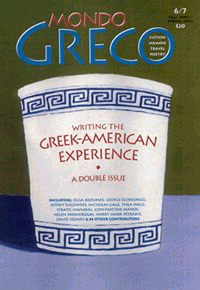
|
The Others are from the Balkans Greece and the New Balkans -- Challenges and Opportunities, Edited by Van Coufoudakis, Harry J. Psomiades, Andre Gerolymatos, Pella, New York 1999, 431 pages. By Dino Siotis
Certainly the Balkans are the countries which, geographically, belong to the Balkan Peninsula, a region comprising Albania, Bosnia-Herzegovina, Bulgaria, Greece, Croatia, FYROM, Romania, Slovenia, European Turkey and Yugoslavia, the territory which recently became the epicenter of turmoil and opinionated unrest. There is, however, an additional implication, bearing the metaphorical connotation that those from the Balkan region are "the others." The French philosopher Jean-Paul Sartre, for example, used the Balkans to metaphorically express the opinion that "the others are going to hell." In examining the views of the members of the European Community and the United States towards this region we can surmise that from Ottoman times until most recently, it has been a region overtaken by chauvinistic passions, swept up by hatred and nationalistic extremities. The dream of many nations for peace and progress in the Balkans has become a nightmare reinforced by many non-Balkan forces. The Slovenian author, Slavoj Zizek, wrote in the London Review of Books that if one asks an individual who comes from a Balkan country where the Balkan boundaries lie, he will answer "it's somewhere down there," pointing to somewhere far away from his fatherland. The Slovenian will insist that Slovenia is not part of the Balkans, but a "piece" of Europe and that the Slovenian people are the last "stronghold" of the European civilization. The Serb will insist that the Balkans begin at Kosovo, or perhaps Bosnia, with Serbia defending civilized Christian Europe. For the Croatians, the Balkans begin with "Orthodox and Byzantine Serbia," while Croatia is the country which defends Western democratic values. Many Greeks, on the other hand, believe that Greece belongs to the Balkan region, while others feel that Greece is part of Europe, and a significant number will arrogantly answer that the Balkans begin just to the north of Macedonia.
It can be said that all these theories represent the "metaphorical" interpretation of the Balkan issue. But what are the "New Balkans", these countries formed after the fall of communism and Yugoslavia's breakup? Can one really talk about the "New Balkans?" Are they "new" because the form of government has changed, elections take place and some kind of more or less democratic rule exists in the region? Indeed, the countries examined in these volumes could very well have been a part of a map of the "New Balkans," if they could only rid themselves of nationalistic poison and free themselves of the kind of religious fanaticism which rejects noble ideological competition and promotes prejudice. To label these countries "New Balkans" we simply refer to the new map, which includes the new countries, and not to something culturally and socially new. The volume Greece and the New Balkans is divided into four parts: History; Economic and Cultural Relations; Foreign Policy and Civil Security; and Greece's Security. Each of these four topics contains three to five reports by authors with enormous expertise on issues relating to current developments in the Balkans. These scientists base their work on a sound foundation, analyzing their positions and supporting their theories with solid arguments. Greece's political stance on the New Balkans can be regarded as based on two dynamics: the promotion of bilateral cooperation as means of stability; and the economic development of southeastem Europe and its gradual merger with the European structure. Today's "hot" subject is the minority issue in the Balkans. With the exception of Greece, the Balkan countries encompass a number of heterogeneous populations within their borders. While these minorities could have become part of a multicultural society, delays, historical apprehension, nationalistic extremism and the individual interests of the Great Powers (with the motto: "divide and rule") did not allow these minorities to develop with the countries' majority on an equal level. The result of course is the current catastrophic tempest that has overtaken the region, a situation which will lead who knows where. If we look at the chart included in the volume (p. 219), we can see that Yugoslavia includes Albanian, Hungarian and Muslim minorities; Croatia has Serb, Muslim and Slovenian minorities; FYROM has Albanian, Turkish, Romanian and Serb minorities; Romania includes a Hungarian minority; Bulgaria has Turkish, Romanian and Slav-Macedonian minorities; while Albania includes Greek Orthodox Christians and Catholic Christian minorities. In Greece 90% of the population are Greek Orthodox Christians and approximately 1% Muslims. The problems associated with the Albanian minority in Yugoslavia and FYROM are emphasized thus by Ambassador Byron Theodoropoulos and Dr. Dimitrios Konstas: if no rights are granted to these minorities, the result will be ethnocentric disturbances and social rage. What is required for the New Balkans of the 21st century is a collective "vision" stemming from international rules and regulations, a vision which has never before existed for this part of the world. Now we are suffering the results of this oversight. Although the book is scientifically thorough and its historical value undeniable, because of the instability in the region and the ever-changing conditions, it may inevitably not represent the most current events. In any case, Greece, according to the authors of the book, did whatever she could in the region. During the years 1992 to 1995, the Greek government foresaw the leading role the Greek State could play in the New Balkans -- and, in playing that role, became the most advanced country in the region. The fact that the Atlantic Treaty transpired and altered the dynamics in the region is another issue. No matter how events will develop -- with the exception of a Greek-Turkish conflict -- Greece will be the country which will be called upon to play a significant part in the rebuilding of this troubled area of Southern Europe, a role which should be well defined. I should note that the book is based on more that five hundred sources and it would be an omission if I did not refer to the twenty-two authors who are professors in various Universities in Europe and North America: Alexandra Arbatova, John Valinakis, Thanos Veremis, Andre Gerolymatos, Byron Theodoropoulos, John latridis, P. loakimides, Pashalis Kitromilides, Van Koufoudakis, Theodore Kouloubis, Dimitris Konstas, Evangelos Kofos, Stephen Larrabee, Thanos Dokos, Victor Papakosmas, Haralambos Papasotiriou, Constantine Svolopoulos, Nicholas Stavrou, Dimitrios Triantafillou, Nick Hristodoulidis, Haris Psomiadis and Axel Sotiris Wallden. Posted December 2003
2000 © Hellenic Communication Service, L.L.C. All Rights Reserved. |


